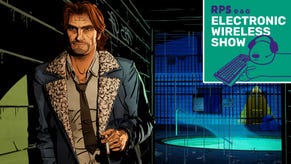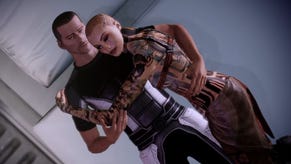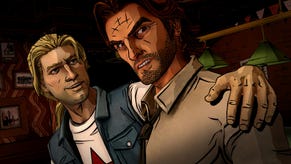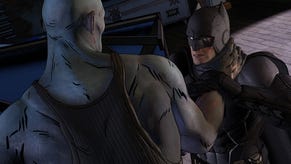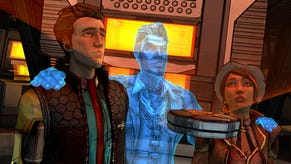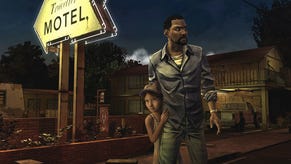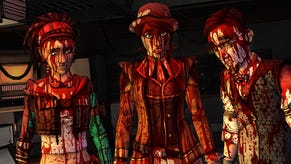Wot I Think: The Wolf Among Us Episode One
The Fairytales of New York
How do you follow The Walking Dead? At a slow pace and a safe distance, preferably while soaked in corpse juices and with intestines draped around your neck. Or, in Telltale’s case, the sensible option is to provide more of the same. The Wolf Among Us, adapted from DC Vertigo’s on-going Fables series, is another comic adaptation and, as with The Walking Dead, its creators care more for their characters than for puzzles or challenge. Here's wot I think of episode one.
My occasionally faulty memory reckons that the puzzles in The Walking Dead faded from episode to episode. Crossing the motel forecourt in episode one didn’t overly tax the brain but it was an extended sequence that required pauses for thought about the immediate consequences of any chosen action. Obstacles in later episodes tended to be solved by looking at every hotspot in a room and then picking a line of dialogue.
The Wolf Among Us continues down this path. Few people would have expected multi-scene puzzles and an overstuffed inventory of nonsense, but it’s important to establish what The Wolf Among Us is. A story, with a few QTE action sequences, dialogue choices that define the future relationships between Bigby and the rest of the cast, and (very) occasional larger choices. I mention all of this not because I want The Wolf Among Us to be something other than what it is but because it’d be unjust of me to spend so much of the week scowling at the Page and Cage show, and making snide comments about the full-screen adverts for Beyond: Two Souls on IMDB, without acknowledging that Telltale’s wolf is barking up a similar tree.
Thankfully, Telltale’s tree is made of sturdy stuff. Whatever the medium, interactive or not, a story with strong writing, engaging characters and decent pacing is a fine thing to explore. As always with Telltale, the license can help or hinder as well, and the studio’s interpretation of Fables is a triumph. Drawing heavily on the first (short) arc of the series, The Wolf Among Us introduces its weird world with confidence and style.
The Fables concept is stupendously obvious, or at least it seems that way to someone who reads a lot of speculative fiction and has been known to spend a working day managing a dark elf sports team. The Fables are characters from fairytales, fiction and folklore who have been cast out of their homelands by the Adversary. Most of them are living out their exile in New York, hidden from the eyes of the mundane world (humans are ‘mundys’) by glamours and other mind-clouding magic. Basic governmental functions assist them in their daily lives but many have struggled to adapt to the city and there are internal conflicts, political and personal.
When I first read the comics, I took the chain-smoking dishevelled Big Bad Wolf in my stride. He looks human, like a cross between Wolverine and Philip Marlowe, and he’s the sheriff of Fabletown and the game’s protagonist here. He conducts his investigations on the mean streets and from his cupboard of an office, its dingy confines set into sharp relief alongside the TARDIS-like meeting room next door, an enormous space containing stacks of legendary artifacts, magically crammed into an apartment block. One of the Three Little Pigs, Colin, occasionally sleeps on the Wolf’s couch, figuring that he’s owed some hospitality considering what happened to his house of straw.
A great part of the pleasure in both the comics and the game is derived from seeing old characters in new roles. Bigby Wolf (geddit?) is immediately relatable but also perhaps the least creative – despite his tendency to transform into his enormous animal form when enraged, he’s more of a borrowing from neo-noir than a reinterpretation of the Wolf. There’s no space or desire for an exploration of the wolf as nature’s red tooth or ferocious lust. Bigby’s past life, as a mass murdering devourer of grannies, becomes his Chinatown. Concealed behind a veil, it’s a dark ‘something’, necessary to his cynicism and rough edges but unexplored.
The Woodsman, Bigby’s old nemesis, is far more interesting and, along with Mr Toad sans Toad Hall, demonstrates Telltale at their best. Both are tragic figures, with a more glorious past behind them, but the writing flickers happily between the serious and the ridiculous. There are moments of exceedingly unpleasant violence right from the opening scene, but they offer more than shock value, helping to unwrap the mysteries as to who these characters really are, and how they are (mal)adjusting to their new lives. In confessional mode, The Woodsman is a key player in the episode’s finest scene, a dive bar conversation that bristles with the threat of violence. Among the threats and machismo, there’s one perfectly delivered gag that not only works as comedic semicolon but also reveals a great deal about his character.
Quality voice acting is necessary for the delivery of such a well-pitched line and the cast are equal to the writing. Even Mr Toad sounds just about as he should – stressed, cocky and downtrodden – rather than being an unbearably twee regional accent accident. Bigby is less gruff than his face and BEING A WOLF suggests he might be, but there’s bite in the voice, even though he rarely loses the hint of good humour that prevents him from being so world-weary that he falls into a coma. I like him and look forward to spending more time in his company.
As a new take on the comics, this is far closer to its inspiration than The Walking Dead. That’s partly because the characters and scenes are mostly drawn directly from the series. Background details are borrowed directly from the books and the recreation of locations is impressive. It’s a shame Telltale don’t allow more time for exploration, particularly as the wealth of allusions and references naturally begs for investigation. The plot, which builds around an ongoing criminal investigation, has powerful forward momentum and there’s little time to stop and take in the sights.
That ties into the main change as compared to The Walking Dead. There are two points in the episode when Bigby must decide between two actions, either delaying the alternative or ignoring it altogether. Whether this leads to a storyline with genuine branches as opposed to The Walking Dead’s subtle differences is impossible to tell for now. Replaying and making different decisions already reveals more than a second playthrough of The Walking Dead ever did though.
My biggest complaint, as a Fables reader, is that this first episode, despite being set before the comics timeline begins, borrows heavily from the first arc. The pairing of Snow White and Bigby to investigate a crime, the introduction of social struggle and even Colin’s couchsurfing – it’s all rather familiar and compounded by the fact that the future of many characters is already known. That said, I’d be interested to see how foreknowledge affects dialogue choices. There are several lines that practically wink at and nudge those in the know.
Still, Bigby fits the role of player character well, being charismatic, recognisable and an investigator, and it’s hard to fault this first episode as an introduction to a complex world. That’s at least partly a result of following the template of those first issues but Telltale do the majority of the work themselves, giving us an intriguing mystery and a Snow White with more personality than a thousand Disney princesses.
Light on challenge, this is the first chapter of a tale well told and it’s probably the most attractive attempt to capture this particular art style in motion that I’ve ever seen. There’s a vibrant almost neon sheen that makes it look quite unique, almost The Walking Dead by way of Hotline Miami at times. Already, there are tasty relationships and plots brewing, and there’s a swagger to the presentation and delivery that feels well-earned.
The Walking Dead used the backdrop of the undead and social collapse to tell a story about survival, parenthood and loss. The choices players made didn’t alter the broad strokes but they did lead to moments that many, myself included, found more personal and touching than they would have been without our input. I’m hoping for more from the big highlighted choices in The Wolf Among Us but even if they lack substance, the Fables are already far more fascinating than zombies and, on this early evidence, Telltale may well find the humanity in this story as well.
The Wolf Among Us: Episode One is out now.







